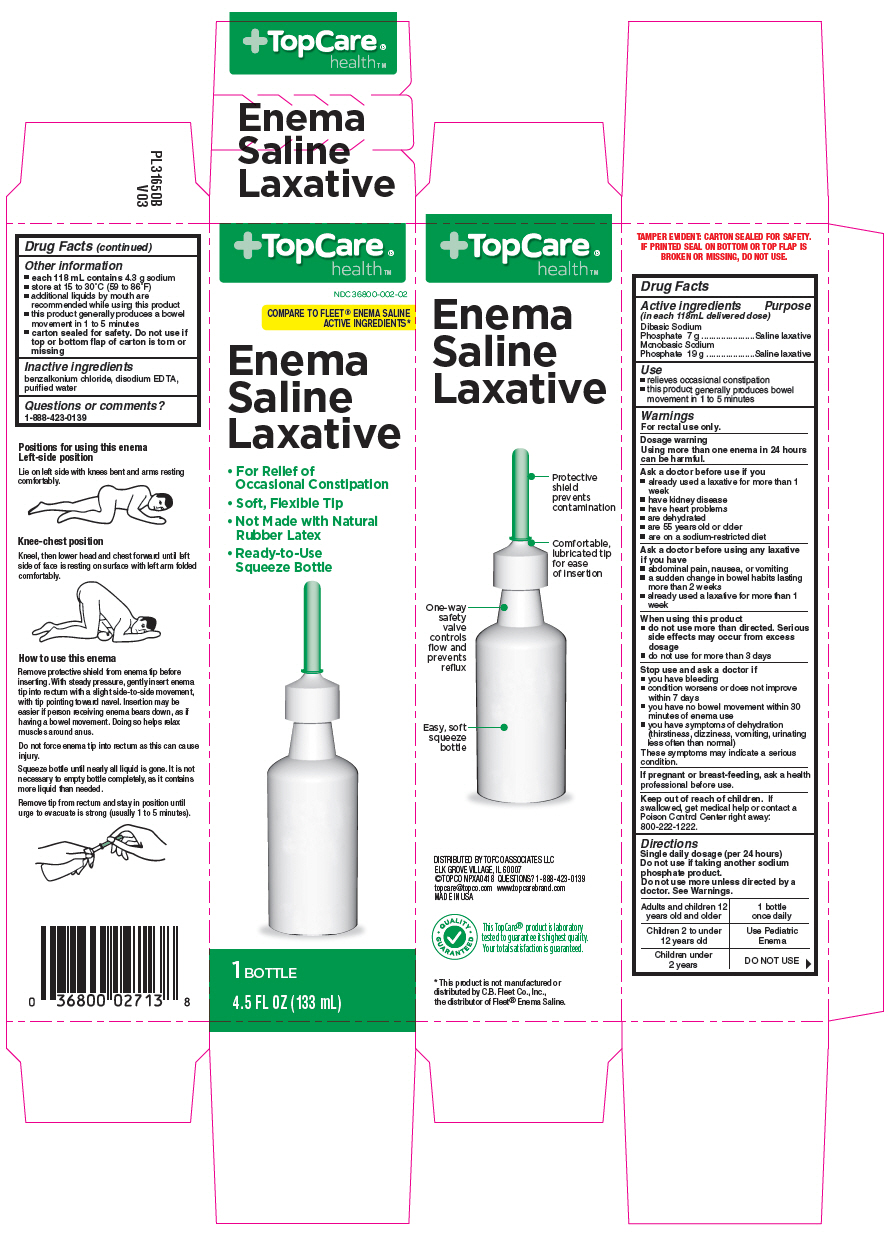Topcare Enema | Dibasic Sodium Phosphate, Monobasic Sodium Phosphate Enema while Breastfeeding

What is Topcare Enema | Dibasic Sodium Phosphate, Monobasic Sodium Phosphate Enema ?
Purpose: Active ingredients (in each 118mL delivered dose) Purpose Dibasic Sodium Phosphate 7 g Saline laxative Monobasic Sodium Phosphate 19 g Saline laxative
Is using Topcare Enema | Dibasic Sodium Phosphate, Monobasic Sodium Phosphate Enema safe or dangerous while breastfeeding?
Topcare Enema | Dibasic Sodium Phosphate, Monobasic Sodium Phosphate Enema Breastfeeding Analsys
Sodium phosphate, dibasic, unspecified form while Breastfeeding
CAS Number: 7558-79-4; 7558-80-7
Phosphate is a normal constituent of breastmilk. Phosphate concentrations have not been measured in breastmilk after large maternal doses of sodium phosphate, such a 30 gram oral dose for pre-procedural bowel evacuation. However, the added phosphate in breastmilk is likely to be only about 130 mg over 24 hours in this situation. The increase from a typical dose of a rectal enema would be considerably less than this amount. Breastmilk sodium concentration is tightly regulated, and will not be affected. It is probably not necessary to suspend breastfeeding after the use of oral sodium phosphate solutions given once or twice for bowel evacuation before a procedure, but if there is concern, suspension of nursing for 24 hours after a dose should result in negligible increase in phosphate ingestion by the infant. Use of a phosphate rectal enema by a nursing mother would require no special precautions.
Sodium phosphate, monobasic, unspecified form while Breastfeeding
CAS Number: 7558-79-4; 7558-80-7
Phosphate is a normal constituent of breastmilk. Phosphate concentrations have not been measured in breastmilk after large maternal doses of sodium phosphate, such a 30 gram oral dose for pre-procedural bowel evacuation. However, the added phosphate in breastmilk is likely to be only about 130 mg over 24 hours in this situation. The increase from a typical dose of a rectal enema would be considerably less than this amount. Breastmilk sodium concentration is tightly regulated, and will not be affected. It is probably not necessary to suspend breastfeeding after the use of oral sodium phosphate solutions given once or twice for bowel evacuation before a procedure, but if there is concern, suspension of nursing for 24 hours after a dose should result in negligible increase in phosphate ingestion by the infant. Use of a phosphate rectal enema by a nursing mother would require no special precautions.
What should I do if I am breastfeeding mother and I am already exposed to Topcare Enema | Dibasic Sodium Phosphate, Monobasic Sodium Phosphate Enema?
We are not completely sure about safety of Topcare Enema | Dibasic Sodium Phosphate, Monobasic Sodium Phosphate Enema in breastfeeding. We would suggest you to contact your doctor or health care provider and explain your situation with Topcare Enema | Dibasic Sodium Phosphate, Monobasic Sodium Phosphate Enema. If you observe anything abnormal with your baby please call 911 or contact emergency services in your area.
My doctor has prescribed me Topcare Enema | Dibasic Sodium Phosphate, Monobasic Sodium Phosphate Enema, what should I do?
If your doctor considers Topcare Enema | Dibasic Sodium Phosphate, Monobasic Sodium Phosphate Enema safe enough to prescribe for you that means its benefits outweigh its known risks.
If I am using Topcare Enema | Dibasic Sodium Phosphate, Monobasic Sodium Phosphate Enema, will my baby need extra monitoring?
Not Sure, Please check with your doctor or lactation consultant.
Who can I talk to if I have questions about usage of Topcare Enema | Dibasic Sodium Phosphate, Monobasic Sodium Phosphate Enema in breastfeeding?
US
National Womens Health and Breastfeeding Helpline: 800-994-9662 (TDD 888-220-5446) 9 a.m. and 6 p.m. ET, Monday through Friday
UK
National Breastfeeding Helpline: 0300-100-0212 9.30am to 9.30pm, daily
Association of Breastfeeding Mothers: 0300-330-5453
La Leche League: 0345-120-2918
The Breastfeeding Network supporter line in Bengali and Sylheti: 0300-456-2421
National Childbirth Trust (NCT): 0300-330-0700
Australia
National Breastfeeding Helpline: 1800-686-268 24 hours a day, 7 days a week
Canada
Telehealth Ontario for breastfeeding: 1-866-797-0000 24 hours a day, 7 days a week
